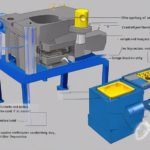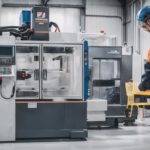Selecting the ideal plastic injection mould involves analyzing material properties for strength, thermal resistance, and impact durability, alongside evaluating mold complexity and design intricacies. Considerations like part volume requirements influencing mold size and production scalability, thermal and mechanical properties impacting performance, and meticulous cost analysis for budgeting all play vital roles. Your knowledge of these factors will help you make informed decisions for your project's success.
Considerations for Plastic Material Selection
What key factors should be carefully evaluated when selecting plastic materials for your injection molding project to guarantee peak performance, durability, and appearance of the final product?
Material selection plays an important role in the success of an injection molding project, influencing properties like mechanical strength, thermal resistance, and cost-effectiveness. When choosing a plastic material, considerations such as high impact resistance, tight tolerances, and material costs should be thoroughly assessed to secure the desired outcome.
The mechanical properties of the material, including hardness and flexibility, directly impact the performance of the final product. Additionally, understanding the thermal resistance of the plastic is essential to prevent deformation or failure during the injection process.
Additionally, material selection affects mold design, production efficiency, and overall project success, making it essential to select the most suitable plastic material based on the specific requirements of the project. By evaluating these key factors meticulously, one can optimize the injection molding process and achieve superior results.
Evaluating Mold Complexity and Design

Evaluating the complexity and design of the mold is vital in determining the best production efficiency and cost-effectiveness for an injection molding project. Mold complexity directly impacts various aspects of the manufacturing process, including part quality, cycle time, and tooling costs. Design intricacies play a significant role in deciding between standard or custom molds. Projects with complex geometries often necessitate advanced mold design and manufacturing techniques to meet the desired specifications.
Assessing Part Volume Requirements

Considering the intricacies of mold design and the impact of part complexity on manufacturing efficiency, evaluating part volume requirements is essential for selecting the appropriate mold size and capacity. Determining the necessary part volume is vital in guiding the choice of the right mold for the project.
By appraising the production volume demands, one can guarantee that the selected mold can efficiently meet the project's requirements. Part volume requirements not only influence the mold design complexity but also play a significant role in production scalability. Understanding the part volume needs is critical for selecting a cost-effective mold solution that aligns with the project's goals.
Factors such as material properties, low shrinkage, and high manufacturing process efficiency must be taken into account to select the best mold for the intended production volume. This thorough evaluation ensures that the chosen mold can handle the required part volume effectively and efficiently.
Understanding Thermal and Mechanical Properties

Thermal and mechanical properties are fundamental aspects to comprehend when aiming to select the most suitable plastic injection mould for a project. Considering thermal properties like heat deflection temperature is important in ensuring the mold can withstand high temperatures without deformation.
Understanding the mechanical properties of plastics, such as tensile strength and flexibility, is essential for determining how the mold will perform under stress and strain. Material properties like hardness and stiffness play a significant role in the overall durability and performance of the injection mould.
The flexibility of the chosen plastic will impact its ability to endure impacts and stresses, directly influencing the longevity of the mould. Additionally, selecting a plastic with the appropriate weight and density is crucial to meet the usability and functionality requirements of the final product.
Cost Analysis and Budgeting

Understanding the financial implications associated with selecting a plastic injection mold is pivotal in ensuring project viability and success. Cost analysis in plastic injection molding involves a thorough evaluation of initial mold build costs, material expenses, and production costs.
Budgeting for an injection molding project necessitates considering factors such as mold complexity, material selection, and production volume. By understanding the cost breakdowns, resources can be allocated efficiently, and plans can be made to enhance project profitability.
Effective cost analysis is essential for optimizing the budget for both mold construction and the production process. Accurate budgeting for a plastic injection mold is vital for ensuring cost-effectiveness and overall project success. By carefully evaluating costs, analyzing expenses, and budgeting appropriately, companies can make informed decisions that lead to successful outcomes in plastic injection molding projects.
Frequently Asked Questions
How to Choose Plastic for Injection Molding?
When selecting plastic for injection molding, consider material properties like hardness, flexibility, and weight. Different plastics, such as ABS, PC, PA, POM, PMMA, and PEEK, offer unique characteristics for various applications. Cost-effectiveness and suitability for the intended application should guide material selection.
Understanding the thermal and mechanical properties of plastics is essential for successful injection molding projects. The chosen plastic should align with project objectives, environmental requirements, and product lifespan considerations.
How to Choose a Plastic Injection Molding Machine?
When selecting a plastic injection molding machine, consider important factors like:
- Clamping force
- Injection pressure
- Shot size capacity
- Control systems
- Tonnage capacity
Evaluate the machine's cooling system efficiency and automation features to enhance production efficiency and reduce cycle times.
Choosing a machine that aligns with your project's requirements is essential for achieving consistent part quality and precise molding processes. Conduct thorough research to make sure the machine can meet your plastic molding needs effectively.
What Is the Best Plastic for Injection Molding?
When considering the best plastic for injection molding, factors like desired properties, application requirements, and budget constraints are essential. Common plastics used include ABS, PC, PA, POM, and PMMA, each offering unique characteristics.
Material selection impacts product quality, performance, and production efficiency. Considerations such as material strength, flexibility, thermal resistance, and cost-effectiveness play a significant role in choosing the appropriate plastic.
Understanding specific properties and benefits of different materials is essential for successful injection molding projects.
What Size Injection Moulding Machine Do I Need?
Determining the appropriate size of an injection molding machine is essential for efficient production. Factors such as part volume, dimensions, shot size, and clamping force play pivotal roles in this decision.
Machine tonnage varies from small for simple parts to large for intricate components. Consulting with experts in the field can aid in selecting the best machine size tailored to your project's specific requirements, ensuring high-quality results and cost-effectiveness.
Conclusion
To sum up, selecting the appropriate plastic injection mold for a project is akin to choosing the perfect tool for a specific task.
Careful consideration of material properties, mold complexity, part volume requirements, and cost analysis is crucial to guarantee successful production.
By thoroughly evaluating these factors, manufacturers can optimize efficiency and quality in their plastic injection molding processes, ultimately leading to successful project outcomes.







